Hannah Warren attends the Addiction Policy Forums' Anti-Stigma Institute
While attending the Anti-Stigma Institute, Hannah became certified to facilitate two trainings designed by the Addiction Policy Forum to increase knowledge about addiction, decrease stigma around substance use disorder, and increase confidence in better supporting those who need help. The flyers linked below provide more information about these trainings.
East Tennessee College of Public Health plays a major role in the regional response to the opioid crisis
East Tennessee State University has played a major role in bringing much needed funding to strengthen addiction recovery in the region. As part of a larger coalition, including the leadership of the ETSU Addiction Science Center, three of the ten projects for which ETSU received funding from the Tennessee Opioid Abatement Council were led by faculty in the College of Public Health.
Regional collaboration nets major funding for addiction treatment
When Frontier Health and East Tennessee State University’s Addiction Science Center (ASC) established the Regional Recovery Ecosystem Advisory Council (RREAC) in 2022, its goal was to prioritize opportunities to strengthen addiction recovery in the region. From the beginning, the RREAC included elected officials, leaders from recovery community organizations, Ballad Health and the First Tennessee Development District. Members of the RREAC spent much of the last year working on a coordinated effort to secure grant funding to address gaps in the region’s recovery ecosystem, a term that describes the factors in a community that support individuals in recovery from substance use disorder. Read more...
ETSU College of Public Health receives 2024 ASPPH Harrison C. Spencer Award for Outstanding Community Service
East Tennessee State University College of Public Health (ETSU) has been selected as the recipient of the 2024 ASPPH Harrison C. Spencer Award for Outstanding Community Service. This award recognizes ETSU for its exceptional dedication to enhancing the health and well-being of the communities it serves and underscores ETSU’s diverse history of commitment to improving the lives of individuals residing in Central Appalachia and similar rural and underserved regions. Their tireless efforts have not only made a significant impact on the health outcomes of these communities but have also served as a model for others striving to enact positive change. Congratulations to Dean Randy Wykoff and ETSU faculty and staff!
Addiction Science Center reports on overdose prevention
In December 2023, the Addiction Science Center released a report with the Tennessee Department of Health Overdose Response Coordination Office (ORCO) called “A Community Needs Assessment of Drug Use and Overdose Prevention, Treatment, Recovery, and Harm Reduction Services in Tennessee”. Read more...

Hagaman receives Susan F. Reid Valued Partner Award
On Wednesday, November 1, 2023, the Board of Directors of the First Tennessee Development District hosted the 57th Annual Meeting in Johnson City. During the Banquet, the District honored Angela Hagaman, Co-Director of the East Tennessee State University College of Public Health’s Addiction Science Center, with the Susan F. Reid Valued Partner Award. Read more...

Dr. Pack speaks on Impact Stigma
Listen to Dr. Robert Pack on Impact Stigma as he goes through ways to use resilience and mindfulness practices to help overcome those challenges. Robert Pack, PhD, MPH is Executive Vice Provost at East Tennessee State University and Professor of Community and Behavioral Health in the ETSU College of Public Health. He is Director of the ETSU Addiction Science Center, Director of the ETSU/NORC Rural Health Research Center, and Co-Director of the Opioids Research Consortium of Central Appalachia.
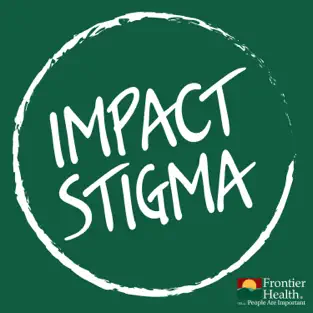
Summit On Substance Abuse Draws Employer Turnout
About 70 representatives of Greene County industries and businesses attended an Employer Summit on Substance Use on April 26, 2023. Dr. Robert Pack, keynote speaker, offered a definition of recovery on an overhead projection he said best fits the process: “Recovery is an individualized, intentional, dynamic and relational process involving sustained efforts to improve wellness.”
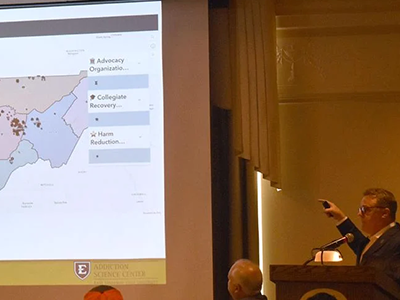
Hagaman publishes in Frontiers in Public Health
Angela Hagaman of East Tennessee State University College of Public Health’s Addiction Science Center is lead author of an article in Frontiers in Public Health. The article is titled, “U.S. Cooperative Extension's response to substance misuse: A scoping review.”
Kristen Roark, alumna of the Master of Public Health program in the College of Public Health’s Department of Community and Behavioral Health, and Lisa Tucker Washburn of the University of Tennessee are co-authors.
The U.S. has experienced exponential growth in overdose fatalities over the past four decades and more than 22 million people are currently living with a substance use disorder (SUD). While great strides have been made in advancing the science of substance use disorder prevention and treatment, proven programs and interventions are not commonly disseminated at scale in impacted communities. Read more...

Hagaman and Pack publish on recovery ecosystems
Dr. Angela Hagaman, Co-Director of the Addiction Science Center in the East Tennessee State University College of Public Health, has published in Addiction Research & Theory. The article is titled, An examination of peer recovery support specialist work roles and activities within the recovery ecosystems of Central Appalachia.
Dr. Kelly Foster and Morgan Kidd of the Applied Social Research Laboratory at ETSU and Dr. Robert Pack, Director of the ETSU Addiction Science Center and the ETSU/NORC Rural Health Research Center are co-authors. More info...

Addiction Science Center earns Advocate of Peer Recovery Service-Agency Award
The Addiction Science Center at East Tennessee State University received the Advocate of Peer Recovery Service-Agency Award from the Tennessee Certified Peer Recovery Specialist Program of the state Department of Mental Health and Substance Abuse Services.
This award, presented at the virtual annual conference of Tennessee Certified Peer Recovery Specialists, is presented to the group or agency that has, over the past year, been at the forefront of advocating for peer recovery services that empower Tennesseans with a mental health and/or substance use disorder. The entity receiving the award has championed the advancement of peer recovery services across the state of Tennessee and has done exceptional work in the peer service movement.
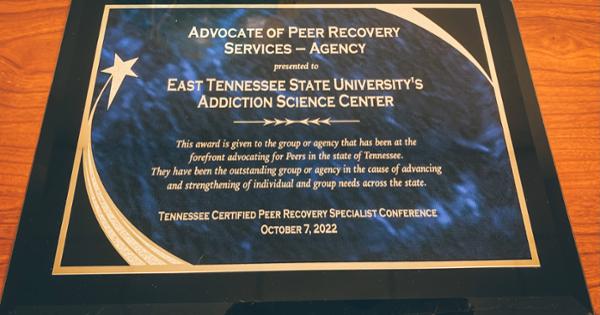
Fletcher Group, NORC and ETSU Launch Substance Use Recovery Tool
NORC at the University of Chicago, East Tennessee State University (ETSU), and the Fletcher Group, Inc. released a mapping tool that enables users to measure the strength of substance use recovery ecosystems for every county in the United States and explore associations with overdose deaths and other sociodemographic and economic factors. The term “recovery ecosystem” is used to describe the factors in a community that support individuals in recovery from substance use disorder.
The Recovery Ecosystem Index Mapping Tool integrates the Recovery Ecosystem Index, overdose mortality rates, and data on poverty, education, and other demographic factors for counties in each of the 50 states. Users can compare county-level information to the rest of their state and to the nation. The tool allows community organizations, policymakers, researchers, substance use treatment providers, other decision-makers, and the general public to explore county-level maps and create data dashboards to understand these factors in their communities and where additional resources are most needed to provide support to individuals in recovery.

Experts: Peer Recovery Is Valuable Yet Under Sourced Resource in Addiction Treatment
Peer recovery support services, Angela Hagaman says, fall outside the Western world’s traditional symptom-reduction model of addressing illness. Hagaman is operations director for East Tennessee State University’s Addiction Science Center. If, for example, you have diabetes, your doctor is likely to put you on a medication, recommend a new diet and monitor your outcomes, Hagaman explains.
But for a substance use disorder, the sources of the issue and the desired outcomes vary from one person to the next. Medication is available to treat the disease, but not every course of treatment works for every person.

“Tipping the Pain Scale” film screening addresses addiction and recovery
The College of Public Health showed the 2022 film on Monday, Sept. 26, in the Culp Auditorium, which was led by Dr. Angela Hagaman, operations director for the Addiction Science Center at ETSU.
The “Tipping The Pain Scale” website describes this feature film as a documentary following individuals from different walks of life that all struggle with America’s systemic failures in dealing with addiction and drug abuse. Furthermore, it spotlights their journeys to developing and utilizing innovative solutions to the problem.
Directly following the film showing, a panel of individuals in long-term recovery– Amanda Silcox, Stanley Williams Jr., and Dr. Dorothy “Dottie” Greene–discussed their thoughts and opinions on the film. They then opened the floor for students and staff to express their concerns and ask questions about drug addiction in their community.

Fentanyl suspected as overdose clusters continue
It’s a scene Angela Hagaman of East Tennessee State University’s (ETSU) Center for Addiction Research is afraid will continue to become more frequent.
Hagaman told News Channel 11 Tuesday the number of overdoses linked to fentanyl have risen dramatically over the past three years. But the two clusters that have occurred just this month — and the seeming presence of fentanyl in non-opioids like cocaine and marijuana — suggests the crisis could be entering a new phase.
“We don’t have any data to confirm, but what we do know is that over Labor Day weekend
there was a cluster of overdose in the downtown Johnson City area, and I believe that
four of those were fatal,” said Hagaman, who has worked in the field for ETSU for
close to a decade.

Housing Summit is in the books!
The first Recovery Housing Summit was a great success! This event featured the collaboration of many community organizations, city groups, and leaders. We look forward to more events as we look to the future of our NE Tennessee area.

‘Leading Voices in Public Health’ lecture to focus on ‘Appalachian Health’
On Tuesday, Sept. 13, several experts from the ETSU faculty provided 10-minute summaries of the chapters they contributed to the book “Appalachian Health: Culture, Challenges and Capacity,” published this summer by the University of Kentucky Press.
Following an introduction by Dr. Wykoff, who provided an overview of the book, presentations were given by:
- Ron R. Roach, chair of the Department of Appalachian Studies, who wrote “Appalachia: An Introduction to the Region”;
- Melissa White, research associate, who co-authored the chapter “The Social Determinants of Health” with Dr. Kate Beatty, associate professor;
- Michael Meit, co-director of the ETSU Center for Rural Health and Research, who co-wrote the “Deaths of Despair in Appalachia” chapter; and
- Angela Hagaman, operations director of the Center for Prescription Drug Abuse Prevention and Treatment, who co-wrote the chapter “The Opioid Crisis in Appalachia” with Drs. Bill Brooks, Stephanie Mathis and Rob Pack of the ETSU Addiction Science Center and Dr. Kelly E. Moore of the Department of Psychology.
Dr. Pack chairs national task force
An expert panel chaired by ETSU’s Dr. Robert Pack released a new report that features dozens of recommendations to address the opioid crisis in the United States.
The Association of Schools and Programs of Public Health (ASPPH) formed the Task Force on Public Health Initiatives to Address the Opioid Crisis. The task force released its findings and recommendations, titled “Bringing Science to Bear on Opioids,” in conjunction with the publication of a related commentary in the Journal of American Medical Association (JAMA). The JAMA commentary was authored by Pack, Dr. Cheryl Heaton of New York University College of Global Public Health, and Dr. Sandro Galea of Boston University School of Public Health.
“The charge of the task force was to identify and define evidence-based public health initiatives for opioid use disorder, recognizing that it is going to take a comprehensive, public health-style approach to really begin to mitigate the harms and consequences associated with the opioid crisis,” said Pack, associate dean in ETSU’s College of Public Health and executive director of ETSU’s Center for Prescription Drug Abuse and Treatment.
Dr. Pack quoted in the Washington Post
Dr. Rob Pack was quoted in the Washington Post article, "Pandemic could be contributing to spike in U.S. overdose deaths."
“It’s not the same as being in a place with that depth of connection that we have from in-person engagement, because connectedness is one of the drivers of recovery,” said Robert Pack of East Tennessee State University. With job losses, isolation and depression, people are “going to be challenged in every direction,” said Pack, who researches addiction issues.
ETSU awarded one of seven Rural Health Research Centers by HRSA
JOHNSON CITY (Aug. 26, 2020) – East Tennessee State University received one of seven
Rural Health Research Center grants, awarded by the Health Resources & Services Administration
(HRSA), Federal Office of Rural Health Policy, to create the Center for Substance
Misuse in Rural America.
The $2.77 million award, which ETSU won in collaboration with the NORC Walsh Center for Rural Health Analysis, part of NORC at the University of Chicago, spans four years.
ETSU, Virginia Tech awarded $2.6 million grant for opioids research
The National Institute on Drug Abuse recently awarded a $2.6 million grant to researchers at East Tennessee State University and Virginia Tech to develop studies on how best to provide support services for individuals being treated for opioid use disorder.
The Studies To Advance Recovery Support (STARS) Network, which will involve researchers across multiple universities and health care systems, will center on the urgent need for research to advance recovery support services in Central Appalachia.
More Tennesseans turn to alcohol during pandemic
Angela Hagaman, operations director at East Tennessee State University’s Addiction Science Center, said alcohol sales have increased during the pandemic.
“We know that alcohol sales are dramatically increasing. Folks are experiencing a
lot more anxiety, depression and hopelessness as a result of COVID, isolation, unemployment
and all of the stressors increasing people’s mental health problems,” she said.

ETSU Center for Prescription Drug Abuse Prevention and Treatment becomes ETSU Addiction Science Center
The East Tennessee State University Center for Prescription Drug Abuse Prevention and Treatment, established in 2016, began 2020 with a new name: the ETSU Addiction Science Center.
The change is part of a concerted effort to keep pace with the evolving nature of the opioid crisis, whereby heroin and fentanyl are now the leading cause of unintentional overdose death in the U.S. — not prescribed pain medications.
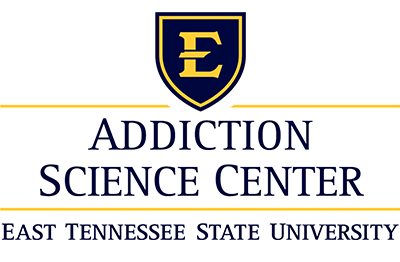
NIH funds study on pharmacists’ impact on opioid crisis
Dr. Nick Hagemeier, an associate professor at East Tennessee State University Bill Gatton College of Pharmacy, has received a National Institutes of Health (NIH) subaward from Duke University for a grant submitted to the National Institute on Drug Abuse (NIDA). The award will continue to support his research into the role of pharmacists in preventing and treating substance use disorders.
‘Responding to the Opioid Epidemic’ topic of ‘Women on Wednesdays’ talk
East Tennessee State University and other local organizations are confronting the opioid epidemic that has swept the Central Appalachian region in recent years.
Angela Hagaman will discuss some of these initiatives in “Responding to the Opioid Epidemic in Central Appalachia: Evidence, Partnership and Innovation,” a free public talk in the “Women on Wednesdays” lecture series at ETSU.
Sponsored by the university’s Women’s Studies Program, the lecture will be held Nov. 6 at noon in the Reece Museum.
Hagaman is the operations director of ETSU’s Center for Prescription Drug Abuse Prevention and Treatment, whose mission is to partner with affected communities in Central Appalachia to advance the science of substance abuse prevention and treatment.
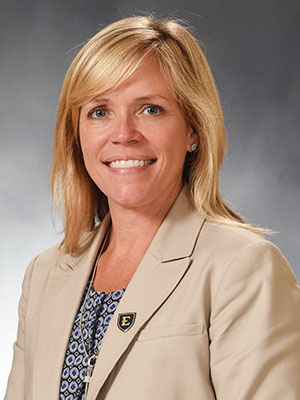
ETSU’s Pack chaired national task force on opioid crisis
An expert panel chaired by East Tennessee State University’s Dr. Robert Pack released a new report today that features dozens of recommendations to address the opioid crisis in the United States.
The Association of Schools and Programs of Public Health (ASPPH) formed the Task Force on Public Health Initiatives to Address the Opioid Crisis. The task force released its findings and recommendations, titled “Bringing Science to Bear on Opioids,” today in conjunction with the publication of a related commentary in the Journal of American Medical Association (JAMA). The JAMA commentary was authored by Pack, Dr. Cheryl Heaton of New York University College of Global Public Health, and Dr. Sandro Galea of Boston University School of Public Health.
Read the Final Report and Recommendations
Other media coverage:

DEA: Nearly half-billion prescription pain pills distributed in NETN, SWVA from 2006-12
New data released by the Drug Enforcement Administration shows nearly a half-billion prescription pain pills were distributed in Northeast Tennessee and Southwest Virginia during the height of the opioid epidemic.
The data, released after legal challenges from media organizations and compiled into a database by the Washington Post, shows that, from 2006-12, 239,652,036 prescription pain pills were distributed in Northeast Tennessee. Over the same period, 184,592,851 pills were distributed in Southwest Virginia.
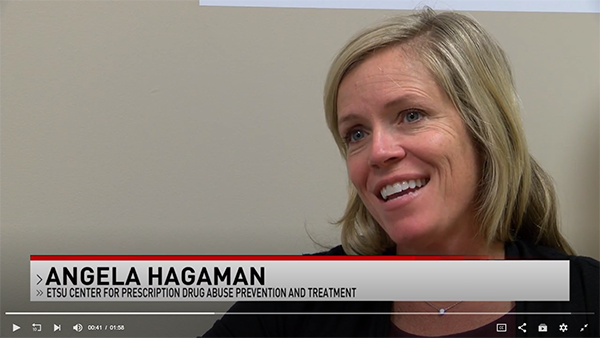
Center Funded Pharmacy Fellow Quoted in NPR's Morning Edition
As a Community Pharmacy Practice Research Fellowship Program fellow funded by the Center for Prescription Drug Abuse Prevention and Treatment, Dr. Dan Ventricelli earned an MPH degree in Community and Behavioral health and completed the fellowship in June 2016. He was recently quoted in a NPR's Morning Edition feature on naloxone. Read more...

All ETSU residence halls now have lifesaving drug Narcan
All East Tennessee State University residence halls now have the lifesaving drug Narcan or Naloxone. It reverses the effects of an opioid overdose in seconds – allowing enough time for medical professionals to step in. Read more...
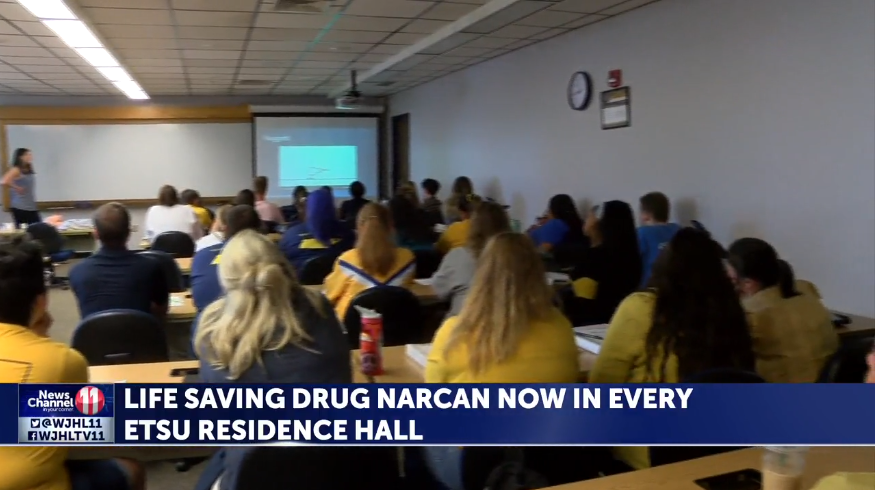
ETSU installs overdose drug Naloxone in every residence hall
While our region continues to fight the opioid epidemic, ETSU pharmacy students are training resident advisers on how to spot and treat overdoses. Read more...
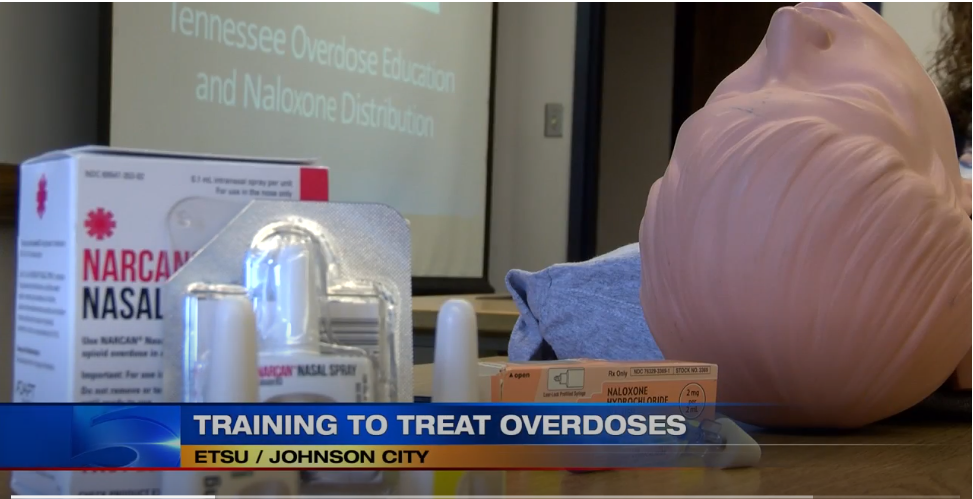
ETSU provides naloxone training to campus community
Many of the nearly 1,300 Tennesseans who died from opioid overdoses in 2017 could’ve been saved with naloxone, a medication which reverses the effects of opioids on the brain. Read more...
Region’s only methadone clinic treating fewer patients than expected but making progress
“People that are not engaged in treatment are about five times more likely to die from an overdose than someone that is engaged in treatment and so there’s a significant benefit,” said Rob Pack, associate dean at ETSU’s College of Public Health. Read more...

Pharmacy faculty member selected for new national pain management task force
Dr. Nick Hagemeier, an associate professor in the East Tennessee State University Bill Gatton College of Pharmacy, is among just 28 individuals – and one of only two pharmacists – across the country appointed to a national task force charged with looking at best practices related to pain management. Read more...
ETSU's Pack appointed to new Substance Abuse Advisory Council
The Appalachian Regional Commission (ARC) announced that East Tennessee State University’s Dr. Robert Pack is one of 24 individuals who will serve on a newly formed Substance Abuse Advisory Council (SAAC). Read more...
Project ECHO
Project ECHO will link specialist teams at an academic “hub” with primary care clinicians in local communities – the “spokes” of the model. Together, you’ll participate in weekly teleECHO™ clinics that act like virtual grand rounds combined with mentoring and patient case presentations.
ETSU and Virginia Tech establish new Opioid Research Consortium of Central Appalachia
East Tennessee State University and Ballad Health are joining forces with institutions across the region to combine resources, communication, workforce and expertise to battle the opioid crisis in central Appalachia. Read more...
ETSU College of Public Health studying heroin use in Central Appalachia
JOHNSON CITY, TENN. (WJHL) - Researchers at East Tennessee State University are using group and one-on-one interviews to identify factors influencing fentanyl-related overdose risk in Central Appalachian heroin user communities.

Cover2 PPT Podcast Features Drs. Loyd and Pack
Cover2 talks to Dr. Stephen Loyd and Dr. Robert Pack about the transformation of their community, which helped establish OverMountain Recovery. This is an outpatient treatment program in the heart of Appalachia that provides counseling and treatment for those battling addiction. The podcast with an introduction from Beth Macy.

IPEC's Final 2018 Webinar Features Robert Pack, Angela Hagaman, and Alice McCaffrey
Drs. Robert Pack and Angela Hagaman along with their clinical partner Alice McCaffrey provided key insights on the goals, public health significance, rationale, and results of their award-winning project East Tennessee State University Responds to the Opioid Epidemic Through Interprofessional Education, Community Engagement, Research, and Clinical Care. Webinar panelists shared remarks on how their innovative approach and collaborative partnerships have impacted the prevention and treatment of substance abuse throughout east Tennessee and the region.
2018 USPHS Award Winner and Finalists Recognized for Exemplary Interprofessional, Team-Based Practice
Rear Admiral Pamela Schweitzer, USPHS, and Dr. Richard Valachovic, Chair, IPEC Board of Directors and President and CEO, American Dental Education Association, presented the award to Dr. Rob Pack, primary investigator of the Diversity Promoting Drug Abuse Research Program (DIDARP), executive director, Center for Prescription Drug Abuse Treatment and Prevention, and Associate Dean for Academic Affairs at ETSU, Ms. Angela Hagaman, director of operations at the Center for Prescription Drug Abuse Treatment and Prevention, and Ms. Alice McCaffrey, director of the Sullivan County Anti-Drug Coalition.

Workplace prevention program could help combat substance abuse
East Tennessee State University is working with area leaders and businesses to combat and prevent substance abuse through a workplace prevention program.
Angela Hagaman, the director of operations for the ETSU Center for Prescription Drug Abuse Prevention and Treatment Team Awareness, said it is clear northeast Tennessee needs more help combating the opioid epidemic. "We all know that we're having a terrible time with this epidemic in our region and in our state," Hagaman said. "Employers keep coming to their elected officials, talking about the difficulty in having a viable workforce."
But she believes and evidence-based prevention program called Team Awareness could help change the tide. The program teaches people about stress management and how to talk to and encourage co-workers to get help before potential problems start.
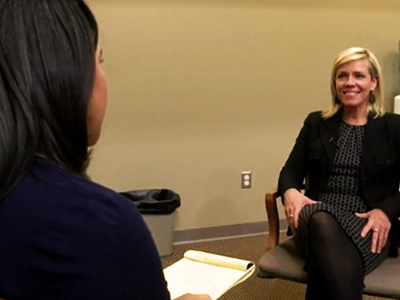
Inside look at Overmountain Recovery treatment program
Two months after a controversial medication-assisted treatment center opened in the Tri-Cities, News Channel 11 got an inside look at the treatment process.
Overmountain Recovery is the first methadone clinic to open in the Tri-Cities and there was a lot of controversy surrounding it.
With opioids, a grim reality for outbreak, communities
As it stands, researchers believe that if something doesn’t change, opioids will be
the cause of death for nearly 500,000 people within the next decade.
While also painting a picture of the epidemic that he says is heaviest in Southwest
Virginia as far as this region, Dr. Robert Pack laid out possible solutions during
the Virginia Rural Health Providers Conference, “Intersections” on Wednesday.
Read more at The Gazette-Virginian...

ETSU researchers building database to track NAS children
JOHNSON CITY, Tenn. — Little is known about the long-term effects of babies born with
neonatal abstinence syndrome caused by opioids, but researchers at East Tennessee
State University are working to change that.
The college’s Center for Prescription Drug Abuse Prevention and Treatment is currently establishing a registry using information from the medical records of hundreds of area babies born in the past five years. It is considered the first step in what organizers hope will become a long-term research project.
Read more at the Bristol Herald-Courier...
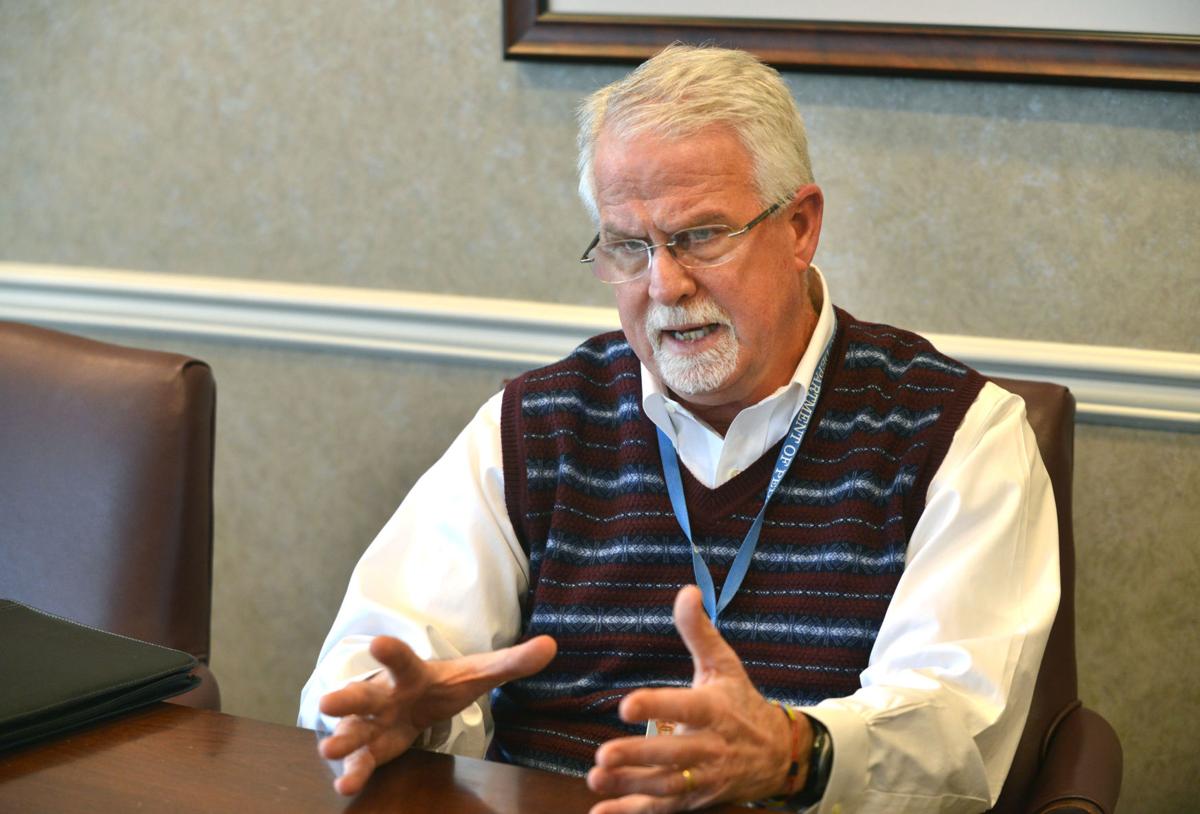
ASPPH Congressional Briefing on Public Health Approaches to the Opioid Epidemic Draws
Standing Room Only Crowd
On Monday June 19, ASPPH sponsored a Congressional Briefing titled, “The Opioid Epidemic:
Findings from Public Health Research Experts.” The session was sponsored by Representatives
Harold Rogers (KY), Tim Murphy (PA), Evan Jenkins (WV) and Bill Johnson (OH). Rep.
Jenkins opened the session, expressing Congressional concern with the impact of the
addiction crisis on constituents.
The Briefing was attended by almost 200 House and Senate staff members, along with various addiction research and treatment leaders and advocates.
Public health school leaders in five states in the Appalachian region participated in the briefing:
- Dean Donald S. Burke, Graduate School of Public Health, University of Pittsburgh
- Dean Donna Arnett, College of Public Health, University of Kentucky
- Dean Jeffrey Coben, School of Public Health, West Virginia University
- Dean William J. Martin II, College of Public Health, The Ohio State University
- Dr. Robert Pack, Associate Dean for Academic Affairs, College of Public Health, East Tennessee State University
They discussed the complex and dynamic processes at work in the opioid crisis and shared their findings on unique approaches to address the course of the epidemic. The speakers also discussed how academic public health is assisting affected communities by bringing traditional and novel epidemic control strategies to the disease, including the development and evaluation of treatment options, law enforcement methods, prevention approaches, and state and local policies.
The session concluded with a robust Q&A session. Many of the participants also visited with their respective Congressional delegations and staffs both before and after the briefing to discuss local aspects of the opioid epidemic crisis.
 Stout Drive Road Closure
Stout Drive Road Closure 